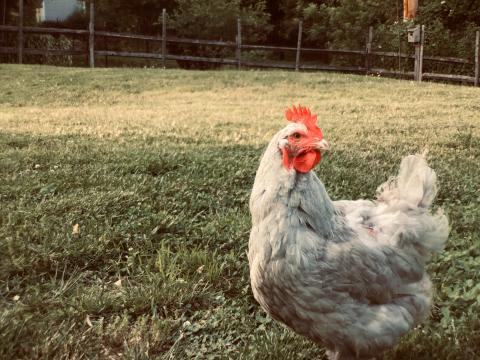I connected with Daniel MacIsaac of Loch Abar Farms shortly after trying the “Loch Abar Chicken Sandwich,” which is a staple at the local café The Tall & Small. Very different from many of the business I usually interview, I thought Daniel could provide some perspective about how the Pandemic has been affecting the grass roots farmers in our area. Amy and Daniel had just welcomed their son Brooks into the world this summer shortly following our chat, and though I reached out during this particularly hectic and exciting time, he was very gracious in returning my call for an interview.
Daniel’s family has been farming in Ohio, Antigonish County for four generations. Daniel has always been heavily involved in the farming industry since he was a youth: first, by working on his uncle’s beef farm, and continuing as a dairy herdsman for two years prior to attending college. Daniel attended the Center of Geographical Science College in the Annapolis Valley to become a surveyor in 2005. Following his graduation in 2006, Daniel moved to Alberta, where he spent 12 years as a surveyor in the oil sands. In 2016, he bought the farm, and moved back to Nova Scotia.
In the summer of 2019, Daniel reached out to the owners of The Tall & Small, Zack and Meghan, about the prospect of bringing in local chicken, to create a truly local product. Daniel says that two were “so excited about the idea, and even named a sandwich after the farm.” Both parties believe that the partnership strengthens their business. Daniel mentions that it is important to keep these sort of partnerships alive and for consumers to pay attention to what is locally produced on restaurants’ menus. Daniel notes, “The term ‘local’ on menus is more often than not a small white lie.” With the government pushing exports as a bigger and cheaper model, many young farmers have had to go elsewhere to make a living, rather than taking over family farms as they may have wanted to. Daniel says that, through his partnership with the Tall & Small, he has seen that local food wins, not just because it is locally produced, but because the quality is better. The buzz that was created around the community is a result of the partnership, as many consumers have now found this new healthy and tasty option rather than the processed products that many other places choose to offer.
Daniel has also been supported by his partner and his parents, who he says have been a great help whenever he needs them. The pandemic has resulted in an enhanced awareness of where we buy our food from, and the sustainability of those sources. Through this new normal that the pandemic has brought, new interest has been generated in Daniel’s endeavor as many consumers began to be nervous that the big box stores would run out of goods. Though Daniel does admit that the pandemic offered a unique opportunity to capitalize on sales, he opted for a different approach. Daniel felt that it was important to ensure that his regular customers, those who had supported him from the beginning, were taken care of first. Moving forward, Daniel will be continuing to serve the usual products, in the same quantity, to ensure quality of the product and service. Daniel believes that because “most of us are so disconnected from our food these days, that we take it for granted that the grocery stores will always be full. Then there are the people who get it. They understand that support for local food is the only real food security we have.” Thus far, Daniel chooses to take the pandemic in stride, hoping that it will open people’s eyes up to the idea of security in local products. Personally, I hope to work harder to incorporate this belief into my own life, purchasing locally made, and developed products directly from those making them, as well as supporting the businesses who support them in a real way.
